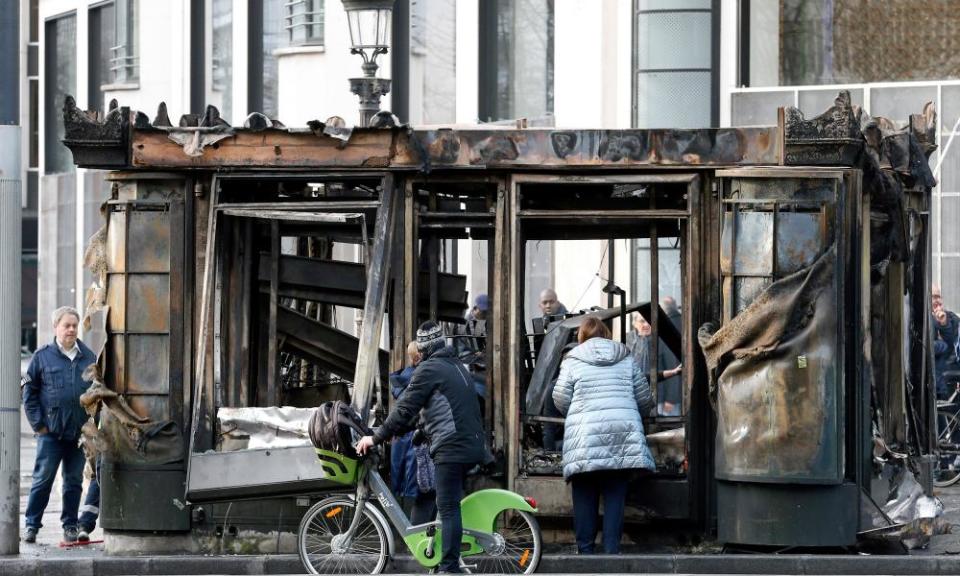When protesters burned news kiosks in Paris, I had to take a stand…

In 47 years of journalism, few things have shocked me as deeply as the sight of burning newspaper kiosks on the Champs-Élysées.
Journalists are supposed to be neutral observers – impassioned but dispassionate. Forget all that. This was personal. This was an attack on the print newspapers that had been my life’s blood from the day I joined the Bolton Evening News in 1972 until the Independent stopped printing in 2016. This was an attack on something endearingly Parisian, something as instantly recognisable as the Eiffel Tower or the burned-rubber smell of the Métro.
What could I do? For once, writing or reporting didn’t seem to be enough. At the suggestion of a friend, I set up a crowdfunder appeal for the stricken kiosk operators. The response was extraordinary – not just from France or Britain, but from all over the world.
I had been tweeting from the Champs-Élysées last Saturday when five of the seven kiosks on the avenue were torched by the so-called “black bloc” ultra-leftists and a militant fringe of the gilets jaunes provincial rebels.
These representatives of 'the people' attacked the livelihoods of those who scarcely earn the minimum wage
The destruction was largely the work of the black bloc urban guerrillas – slender, self-satisfied young men from well-off families, not suffering protesters from a forgotten or peripheral France. These self-appointed representatives of “the people” attacked the livelihoods of men and women who scarcely earn the French minimum wage.
Everyone in Paris has a favourite story about the kiosquiers, the men and women who rent the 300 news kiosks from Paris town hall – their good humour, their bad humour, their wisdom, their knowledge of Parisian gossip and world news, the unwillingness of some to provide change or to give directions or to speak – the abundant willingness of others to do all three.
I made friends in the 1990s and 2000s with Bernard and Louise, a Breton couple who shared duties from 6am to 10pm in a kiosk in the 8th arrondissement. They saw each other for only 20 minutes a day, when Louise replaced Bernard in the early afternoon. When they retired, I got to know Redouan, a jolly kiosquier in the 17th arrondissement. He is a Syrian refugee who has been in Paris for six or seven years. I have been here for 22 years. His French puts mine to shame.
What could be done for the burned-out kiosquiers? I set up a cagnotte (“kitty”) – the crowdfunding appeal – to help not only the Champs-Élysées kiosquiers but also the operators of nine other kiosks burned in Paris, and 13 others severely vandalised.

A burnt-out kiosk after the riots.Photograph: Chesnot/Getty Images
I put in the first €100 at 9am on Monday. Money started to flow in – €1,000 in the first two hours. Contributions, ranging from €1 to €200, came from Europe, Australia, Canada and the United States. Many were from journalists, but by no means all. The Paris street kiosks, stocked with postcards and souvenirs, umbrellas and soft drinks, as well as newspapers, are clearly a much-loved part of the streetscape. Some contributors left messages. David wrote: “Good luck! You deserve support – even from Scotland.” Sharon wrote: “Best wishes from Canada.” Bernadette said: “All my sympathy and support in your distress. You are an irreplaceable component of city life.”
By Friday, the fund stood at €5,291 (£4,500). The Paris Syndicat de Kiosquiers (kiosk operators’ union) has asked me to keep it open until this Wednesday. Several other cagnottes have been created. Funds have also been donated directly by French press groups.
Hocine Drif, president of the union, has promised to distribute the money next week between all kiosquiers who were attacked. A couple of the kiosks on the Champs-Élysées have already been rebuilt; others will be in the next week or so.
Nelly Todde, vice-president of the union, says that the money is urgently needed. “I would like to thank everyone who gave, and especially from abroad,” she said. “Our members have lost everything, all their stock. They still have to pay the suppliers – the insurance can take forever. These are not rich people, far from it. All the money raised is very welcome.”
I will leave the last word to Éric Fottorino, a former editor of Le Monde: “The printed press is a creature of the street,” he said. “Each kiosquier defends a little corner of democracy.”

 Yahoo News
Yahoo News 